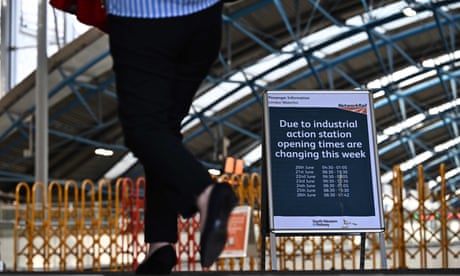The head of Network Rail has denied that the government leaned on it to cap a pay increase for its workers, as it failed to prevent the biggest train strikes in 30 years. Attempts to avert the strikes through talks failed on Monday evening and the RMT accused the government of preventing a deal. The union believes the government put pressure on Network Rail not to exceed a pay increase of 3% because of the precedent this might set and the risk of inflation.
The RMT is asking for a 7% pay rise and has rejected an offer of 2% with a further 1% tied to job cuts. UK rail strikes: what is happening? Read more The transport secretary, Grant Shapps , said on Tuesday that calls for the government to help resolve the strikes by joining negotiations was a “stunt”. The Network Rail chief executive, Andrew Haines, said the government had not had a hand in the company’s pay offer.
Asked four times on BBC Radio 4’s Today programme whether it had been encouraged by Shapps or anyone else in government to stick to 3%, Haines repeatedly denied it. “No, we haven’t [been told to], because the government recognises there’s so much productivity available in the industry that for the right deal we could go above that. So 3% would be a constraint if we weren’t able to achieve any productivity,” he said.
In theory Network Rail is able to offer a higher pay settlement by shuffling its overall budget, but in practice the RMT believes it is toeing the government line. Mick Lynch, the RMT general secretary, said on Monday that Network Rail’s refusal to go above 3% was coming from Shapps’ department, saying “the dead hand of this Tory government is all over this dispute”. Lynch stuck by his position on Tuesday, telling Today: “We believe that the companies can offer [a better deal] and they’re on the verge of doing it but I think the government is stopping them from doing it for an ideological reason.
” Network Rail argues that the union is blocking modern working practices, giving examples such as workers refusing to share vans and restricting the introduction of technology. Lynch insisted the workforce was happy to modernise. He said: “We will use technology and we understand that there will probably be less workers at the end of this process than at the start of it, and what we need to do is say that everybody who wants a job and wants to continue in the new railway framework will have a place in it.
” He called for coordinated industrial action across Britain. “If the government doesn’t change direction, I believe more strike action is inevitable. We as trade unions need to synchronise,” Lynch told Sky News, calling for a pay rise for all British workers.
“If we need to have industrial action, we need to coordinate industrial action in every town and city. ” Shapps confirmed there would be emergency Cobra meetings this week over the strikes. He said ministers would change the law to put in “additional protection” for passengers by allowing firms to use agency workers during strikes.
Sign up to First Edition, our free daily newsletter – every weekday at 7am BST “For future strikes, both in this current but also for other strikes, we are going to ensure that the law is firmly on the passengers’ side,” he told Sky News. “One of the ways is through transferable skills, or agency workers, as you call it. And there are a number of other technical changes we can make to union laws to make sure the public is always protected.
” Asked when he had last met the RMT, he said his rail ministers met them instead as “that is the job of the employees”, and he said calls for him to get involved were “a stunt by unions”. He added: “If I thought it would help, I would at a drop of a hat. ”.
From: theguardian
URL: https://www.theguardian.com/uk-news/2022/jun/21/network-rail-boss-denies-ministers-urged-it-to-cap-pay-offer-rmt-train-strikes



